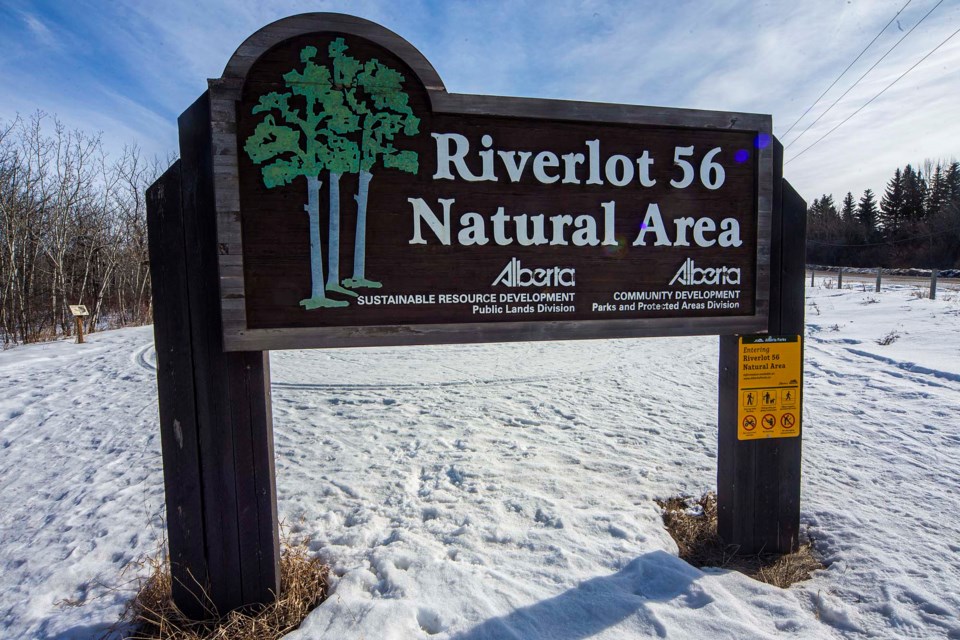Poundmaker’s Lodge has asked the provincial government to return Riverlot 56 to it out of concern it may contain unmarked graves of former residential school students.
Poundmaker’s Lodge Treatment Centres put out a media release June 22 outlining its response to the discovery of hundreds of unmarked graves at former residential school sites in B.C. and Saskatchewan earlier this year.
The discoveries prompted renewed calls to search for unmarked graves at Canada’s other residential schools. The Alberta government announced an $8 million fund on June 23 to support such research.
Established in 1973, Poundmaker’s was built on the site of the former Edmonton Indian Residential School, which was listed as the “Edmonton (Poundmaker)” school in the Truth and Reconciliation Commission’s final report. At least 98 Indigenous Canadians who died from tuberculosis at the Charles Camsell Hospital were buried on the school grounds in unmarked graves; a monument to them now stands in the St. Albert Cemetery.
In early June, Poundmaker’s set up a sacred fire and tipi for ceremonies to honour the children discovered at the former Kamloops Indian Residential School, and opened its powwow arbour to anyone who wished to leave offerings.
The riverlot question
In the June 22 release, Poundmaker’s officials said they had previously identified a number of burial sites on the former school grounds through conversations with school survivors and scans with ground-penetrating radar, and planned to do more scans in the future.
The centre planned to host a gathering of survivors this July 5 and 6, during which survivors would get to view maps of burial sites and participate in ceremonies to advance personal healing. Guests were asked to contact Iskwew program manager Siobhan Dreelan at [email protected] or 780-458-1884 ext. 105 for details.
Poundmaker’s Lodge is also working to create a digital museum about the former Edmonton residential school and had teamed up with the University of Calgary to convert the school’s last surviving building into a historic resource centre.
The release said the Poundmaker’s “has made a formal request to the City of St. Albert and the Government of Alberta for the return of the land adjacent to the former Edmonton Indian Residential School, known as 'River Lot 56' to the Poundmaker’s Lodge Treatment Centres Society as it has been identified by survivors as an area of concern.”
In a phone and email interview, Dreelan said the centre sought authority or ownership over Riverlot 56 as research suggested it may contain unmarked graves linked to the Edmonton residential school.
Dreelan said the centre had discussed the idea with St. Albert chief administrative officer Kevin Scoble and provincial officials, and revived those talks last year when the province proposed to remove some 164 parks sites, including Riverlot 56, from its parks inventory, with ownership of those sites turned over to other groups.
(The province backpedaled on that plan in the face of public protest, and in December 2020 announced it had signed a new lease to have the Riverlot 56 Natural Area Society continue as stewards of the region until 2031.)
Dreelan said Poundmaker’s had not yet determined how a change in authority or ownership would affect public access to the riverlot.
Riverlot 56 Society treasurer Georges Binette said Poundmaker’s had yet to contact his group about this proposal. He was unsure how a change in ownership would affect the region.
“I think we can work with them without having them take over the riverlot,” Binette said, saying that any burial sites could be fenced off while still allowing public use of the rest of the park.
“We feel (the park) belongs to all Albertans, not just one group.”
In an email, City of St. Albert spokesperson Cory Sinclair said the city had not received any letters from Poundmaker’s about Riverlot 56, and would defer any questions on its ownership to the province.
Paul Hamnett, press secretary to Alberta Environment and Parks Minister Jason Nixon, said in an email that the province had held talks about partnering with Indigenous people to protect Riverlot 56.
“Though no formal request has been made, we are open to continuing those conversations.”
Métis join search
Bruce Gladue, president of Métis Local 1904 (the St. Albert/Sturgeon County branch of the Métis Nation of Alberta), said his group planned to apply for federal and provincial funding to search for unmarked graves around Mission Hill (the former site of the Youville residential school) and Riverlot 56. The group planned to work with Poundmaker’s, the University of Alberta, local First Nations, and area governments to determine the best way to do this search.
“We’re going to work with everybody, because that’s the only way we’re going to get through this.”




